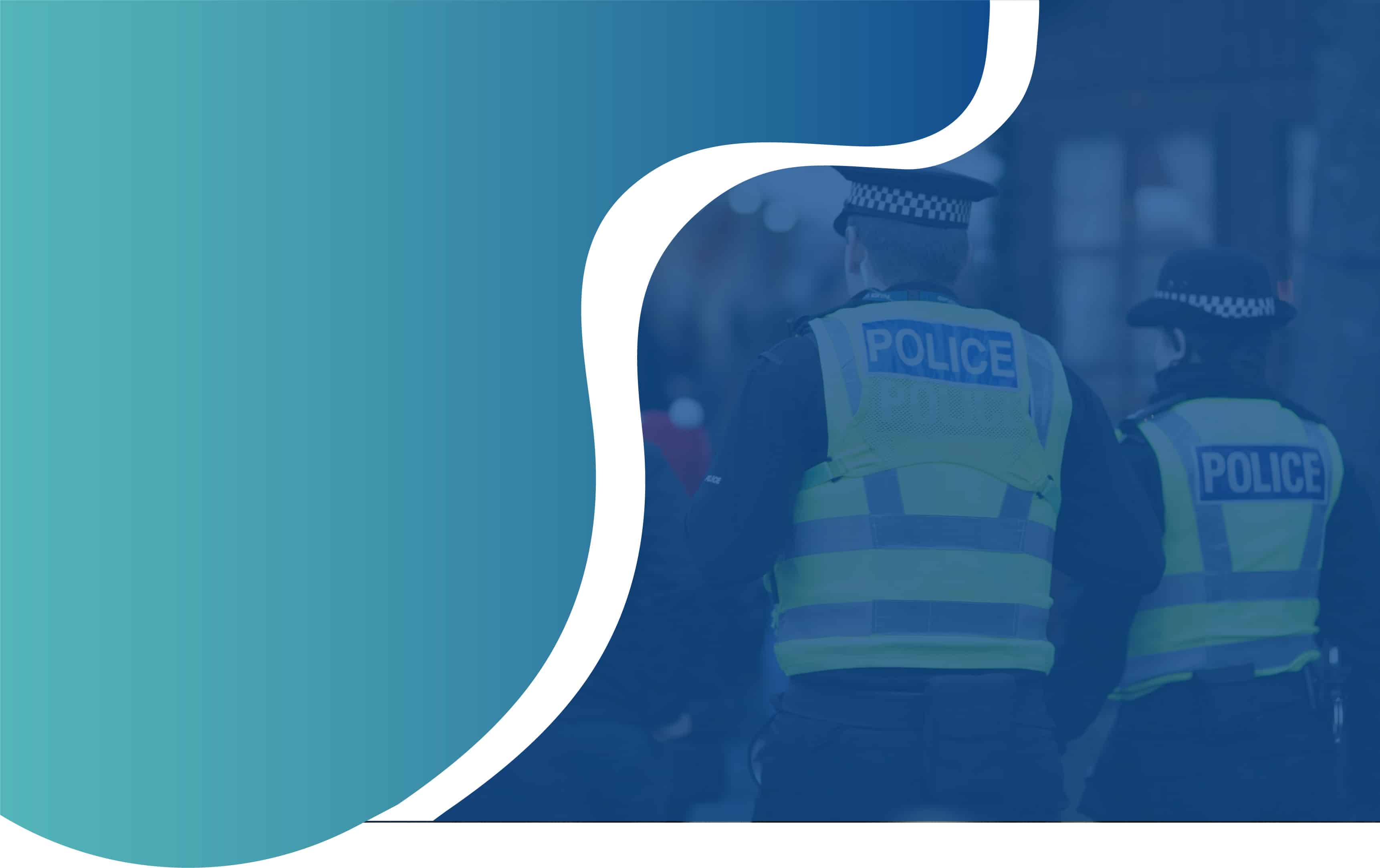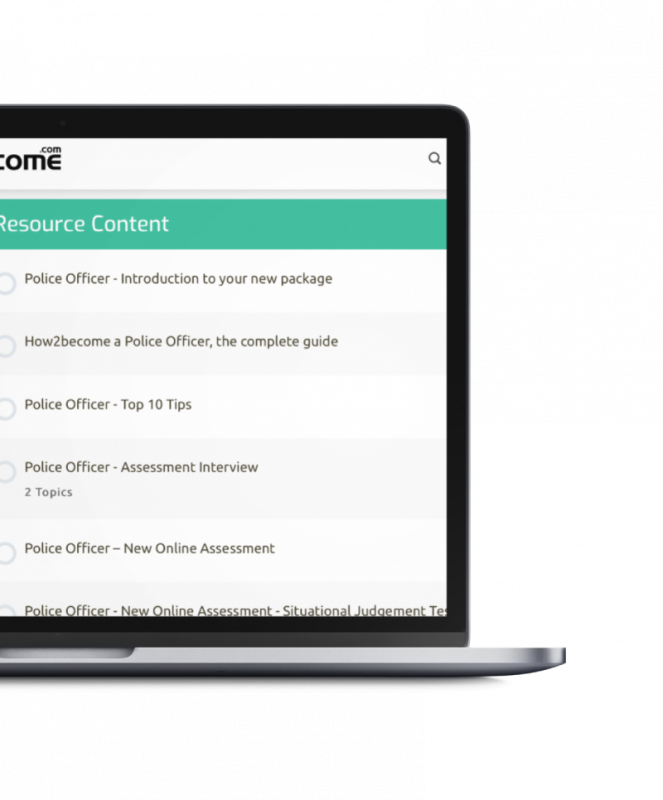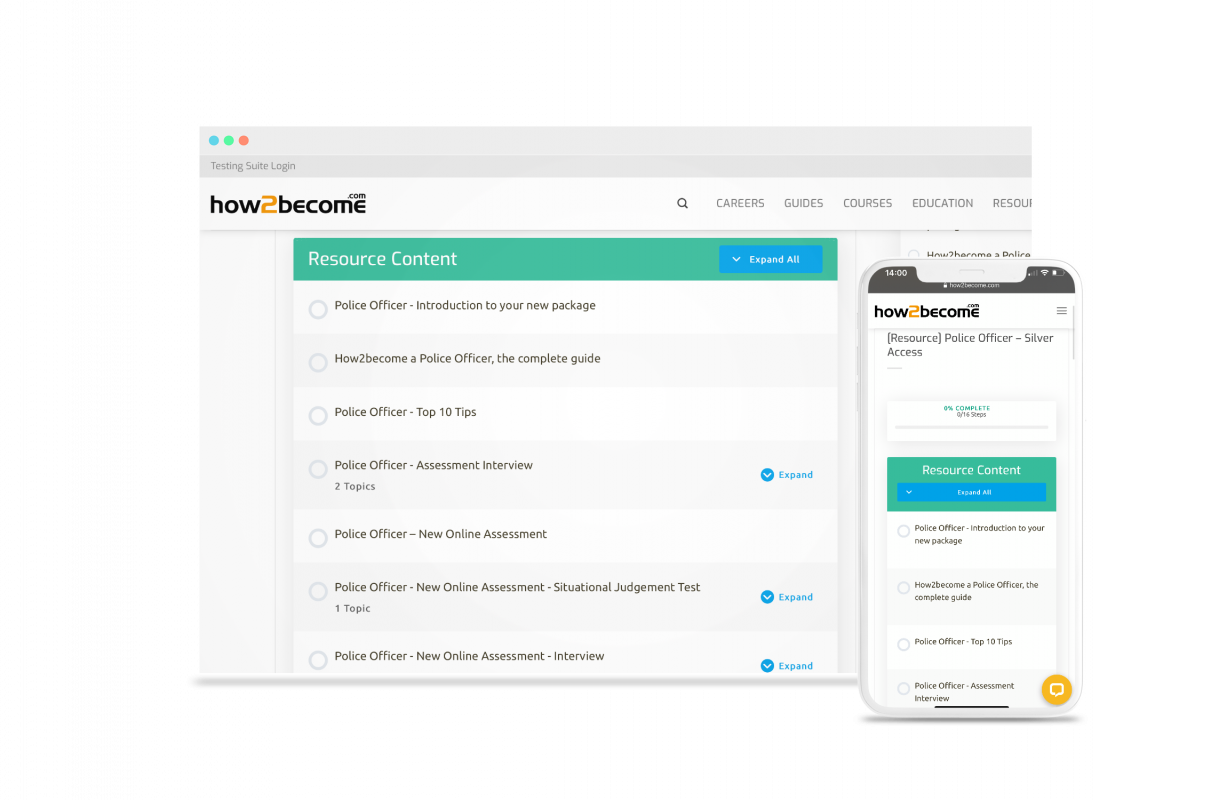
How to Become a Police Officer
The complete guide to becoming a police officer in 2026 and pass the UK recruitment process.
4.9/5 Rating | 1,000+ Reviews
![]()
Training That Works
Discover a masterclass of police recruitment knowledge and insider secrets from How2Become
Unlock Your Potential
Whether you’re just starting out or you’re reapplying, you will get access to on-demand training that will catapult your career
Powerful Resources
Get instant access to the on-demand police recruitment training guides, interactive online tests, and video modules – suitable for all England and Wales Police Forces
discover how to join the police
If you are going to apply to become a police officer our POWERFUL guide is guaranteed to help you pass the selection process. It contains actual police application form responses that you can use to form your own unique winning answers, insider tips on passing the National Police Assessment Centre, sample police interview questions, and successful responses for every stage of the process.
Let’s start off by telling you what the UK selection process involves and how we can help you join the police!
We have collated a mass of insider information on how to successfully pass the selection process and it is all available on this page.
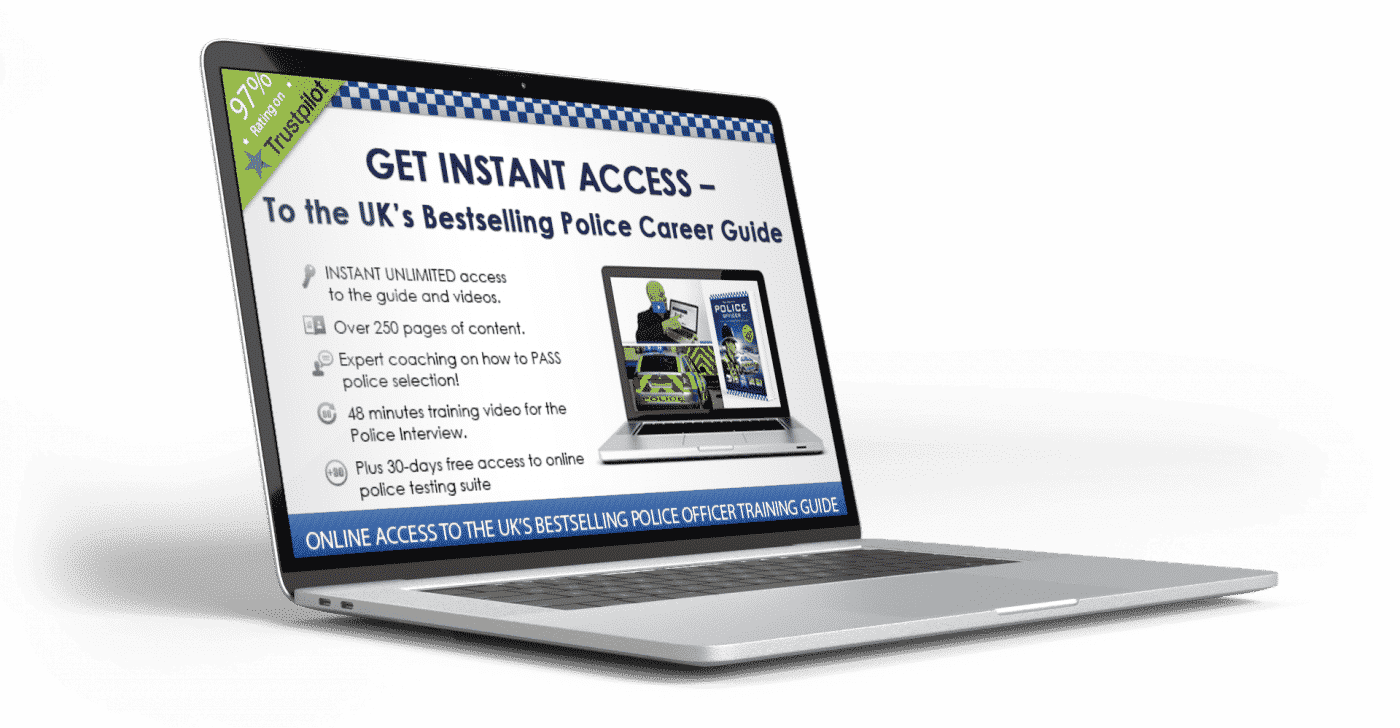

How to Join the Police
The selection process to join the police in England and Wales will normally consist of the following elements:
Competency-Based Application Form
National Online Police Assessment Process
Full Vetting and Final Interview
Medical and Fitness Tests

Stage 1 – Completion of the competency-based application form
The application form is the first stage of selection. You will normally be required to complete the form online and it should be your priority to ensure that you match the assessable core competencies that are relevant to the role.
Police forces will also require you to complete one or two exercises which could include an Online Situational Judgement Test and a behavioural styles questionnaire, or an assessment of the specific forces choosing, as a means to sift out applicants who do not match the values and qualities required to join the police. There are currently three different SIFTS being used national by police forces:
- National SIFT: This consists of two online exercises; A Situational Judgement Test and a Behavioural Styles Questionnaire.
- In-force SIFT: The force you have applied to will advise you when you apply of the type of SIFT assessment you will face. Many forces have started using a telephone interview as an initial SIFT.
- Online Assessment Stage 1 SJT: The last form of SIFT is the stage one of the OAC (Situational Judgement Test). IMPORTANT!: This form of SJT has a different answer structure to the national sift SJT. In the OAC sift you need to choose the most appropriate answer, whereas, the national sift SJT requires the candidate to rank each each answer to a sliding scale.
Stage 2 – National Police Officer Assessment Centre
Once you have successfully passed the application form you will be invited to take part in an online assessment process. During which you will be required to undertake the following online assessments:
Situational judgement test (or SJT)
Competency-based video interview
Briefing exercise
Written exercise
If you have already taken the SJT as part of the SIFT, you will not be required to undertake the OAC SJT and will move on to stage 2 competency-based interview.
The pass mark for the Online Assessment Centre is usually an overall score of 55% – remember, throughout the assessment centre you will be assessed against the core competencies.


Stage 3 – Full vetting checks and a possible final interview
Many UK Police Forces are now requiring applicants to sit a final interview in addition to the competency based online assessment centre interview. Due to the pandemic, the “final interview” is sometimes carried out before the Online Assessment Process and is known as the “in-force interview”. In addition to this, you will also undergo a number of vetting checks to ensure that you meet the minimum eligibility requirements for becoming a police constable.
Stage 4 – Medical and fitness assessments
The final stages of selection involve a medical and a fitness test. The two elements of the police fitness test are: the dynamic strength test and the endurance fitness, or the bleep test, as it is sometimes called.

Career defining knowledge.
Watch the video to find out how this resource will help you.
How to Become A Police Officer: Commonly Asked Questions
One of the questions we are asked on numerous occasions is; “Do you need a degree to be a police officer”. There are several entry routes to joining one of the 43 police forces in England and Wales, including one for degree holders, but also entry router for candidates without a degree..
Direct application – with a direct application you will typically need two A-levels, an equivalent level 3 qualification, or relatable experience from a similar field such as the Armed Forces.
Apprenticeship – if you do not already have a degree you can apply via the Police Constable Degree Apprenticeship scheme. This is a three-year degree apprenticeship which combines education alongside working in the field. In order to be eligible for the PCDA you must have passed GCSE English language with a grade of C/4 and above.
Degree-Holder Programme – if you already have a degree (this can be in any subject) then you can explore the option of this two-year training programme which concludes with a graduate diploma in professional policing and offers options into specialist routes such as investigation which can lead to a detective constable role.
Being 40 is definitely not a reason to put off changing careers to become a police officer. Police constables have a compulsory retirement age of 60, so with an allowance for the probationary period the upper-limit for applications is around 57 years old. You can apply for a police constable role as young as 17, though you will not be permitted to start until you are 18.
For police constables in England and Wales, the starting salary is £20,880-£24,177 per annum. After several years in the role you could achieve a salary of up to £40,128 per annum. You may also receive a location allowance which can be several thousand pounds in addition to your salary. After you have completed your initial two year probationary period as a police constable, there may be opportunities to move into a specialist role which may include a salary increase.
There is no set schedule for police constable recruitment but most forces are open for applications regularly. Operation Uplift is still in effect with the goal of recruiting 20,000 new police officer before March 2023 with each constabulary receiving a target of how many new recruits to employ. Operation Uplift is currently running on target, despite the COVID-19 pandemic and the release of a brand-new assessment process launched by the College of Policing in May 2020. This new online assessment process, which consists of never-seen-before exercises, has made is possible for all police constable applicants to continue with their applications throughout national and local lockdowns to keep police recruitment active. Although the selection process has changed since the pandemic, the requirements to becoming a police officer remain the same.
Yes, you are paid during your training period, as this will be combined with active duty as a probationary police officer. however the pay will be different depending on your level of entry. For example if you join via the PCDA route, you will be on the lower end of the scale. However, once your initial police officer training this will be increased by the police force. After 1 year’s service your pay will increase again. If you join via the DHEP, the same procedure applies, although your starting salary may be slightly higher than the PCDA scheme, but this can vary by the different police forces.
If you decide to apply via the Pre-Join route, as you are not applying until after you have completed the degree, of course you will not be paid as you are not yet a police officer.
The selection process can take up twelve months to complete, but this depends on a number of factors, such as the number of applicants, vetting requirements, spaces for intake dates. In some cases, this could be sooner between 6 to 9 months, but please allow for 12 months.
There are currently as of the 1st November 2022, 36 police services are recruiting for police officers. There are various entry routes available, and we will list each force and the entrance routes they currently have active:
Devon & Cornwall Police
- Apprenticeship (PCDA)
- Degree Holder (DHEP)
- Professional Policing Degree Holder
- Detective (Degree Holders)
Dorset Police
- Apprenticeship (PCDA)
- Degree Holder (DHEP)
- Professional Policing Degree Holder
- Detective (Degree Holders)
Hampshire Constabulary
Bedfordshire Police
Hertfordshire Constabulary
Cambridgeshire Constabulary
Suffolk Constabulary
- Apprenticeship (PCDA)
- Degree Holder (DHEP)
- Professional Policing Degree Holder
- Detective (Degree Holders)
- Traditional (IPLDP)
Norfolk Constabulary
- Apprenticeship (PCDA)
- Degree Holder (DHEP)
- Professional Policing Degree Holder
- Detective (Degree Holders)
Cheshire Constabulary
Greater Manchester Police
Cumbria Constabulary
North Yorkshire Police
South Yorkshire Police
Humberside Police
North Wales Police
- Apprenticeship (PCDA)
- Degree Holder (DHEP)
- Professional Policing Degree Holder
- Detective (Degree Holders)
Gwent Police
Dyfed-Powys Police
South Wales Police
West Midlands Police
- Apprenticeship (PCDA)
- Degree Holder (DHEP)
- Professional Policing Degree Holder
- Detective (Degree Holders)
Warwickshire Police
West Mercia Police
- Apprenticeship (PCDA)
- Degree Holder (DHEP)
- Professional Policing Degree Holder
- Detective (Degree Holders)
Staffordshire Police
- Apprenticeship (PCDA)
- Degree Holder (DHEP)
- Professional Policing Degree Holder
- Detective (Degree Holders)
- Traditional (IPLDP)
Leicestershire Police
Derbyshire Constabulary
Northamptonshire Police
Sussex Police
- Apprenticeship (PCDA)
- Degree Holder (DHEP)
- Professional Policing Degree Holder
- Detective (Degree Holders)
Surrey Police
- Apprenticeship (PCDA)
- Degree Holder (DHEP)
- Professional Policing Degree Holder
- Detective (Degree Holders)
Kent Police
Essex Police
Thames Valley Police
- Apprenticeship (PCDA)
- Degree Holder (DHEP)
- Professional Policing Degree Holder
- Detective (Degree Holders)
Northumbria Police
- Apprenticeship (PCDA)
- Degree Holder (DHEP)
- Detective (Degree Holders)
- Professional Policing Degree Holder
Cleveland Police
Nottinghamshire Police
Metropolitan Police Service
As you progress in your career as a police officer, there are numerous opportunities for career advancement and specialisation. After completing your initial training, you will be required to undergo a probationary period as a police constable. Once you successfully complete this period, you will have the chance to move up the ranks within the police service.
Within the police service, there are clearly defined ranks that you can attain through gaining experience and successfully passing additional examinations. With time, dedication, and continuous learning, you have the potential to climb the career ladder and reach higher positions. The ranks you can aspire to include sergeant, inspector, and chief inspector.
In addition to rank progression, there are also various opportunities for specialisation within different areas of policing. Depending on your interests and skills, you can choose to specialize in fields such as criminal investigation department (CID), anti-fraud or road traffic, drugs or firearms, counter-terrorism, air support or underwater search, dog-handling, or mounted policing.
If becoming a detective is of interest to you, joining the CID will allow you to add the title of detective to your rank. For instance, you may become a detective sergeant or a detective chief inspector, working on more complex and intricate investigations.
Overall, the police service offers a comprehensive career progression path where you can advance in terms of rank and also specialize in specific areas based on your interests and capabilities.
The working environment for a police officer can be diverse and challenging. As a police officer, you would find yourself in various situations and locations while fulfilling your duties.
One aspect of the working environment involves responding to calls for help from the public. Whether it is attending to emergencies or addressing community concerns, you would be required to quickly assess and respond to different situations. This could range from dealing with incidents involving public safety to addressing crimes and offenses.
Investigating crimes and offenses is another crucial aspect of a police officer’s working environment. This includes gathering evidence, interviewing witnesses, and interrogating suspects. The investigative process often requires staying vigilant and paying attention to details.
You may also find yourself giving evidence in court as part of your responsibilities. This involves presenting factual information and supporting legal proceedings through testimony. Your testimony could contribute to the overall justice system and the resolution of criminal cases.
The working environment for a police officer can also involve controlling traffic and maintaining order at large public events and gatherings. This requires effective crowd management skills, as well as the ability to handle challenging situations that may arise.
Another essential aspect of the working environment is advising the public on personal safety and crime prevention. As a police officer, you would play an important role in educating the community about ways to protect themselves and prevent crime. This aspect requires effective communication skills and a commitment to promoting safety within the community.
Moreover, promoting respect for people in relation to their race, diversity, and human rights is a significant part of a police officer’s working environment. Encouraging inclusivity and ensuring fair treatment for everyone is crucial in maintaining public trust and solving disputes.
In terms of physical surroundings, a police officer may work both on patrol and at a police station. This means that you may be outdoors in all weather conditions and face physically demanding situations. The job can also be emotionally demanding due to the nature of the work, including dealing with traumatic incidents and witnessing challenging situations.
It is important to note that you may be required to wear a uniform while on duty, which is part of the working environment for a police officer.
Overall, the working environment for a police officer is dynamic and requires adaptability, resilience, and a commitment to upholding public safety and justice.
In order to become a police officer, it is necessary to possess various skills and knowledge. These include a comprehensive understanding of legal matters, including court procedures and government regulations. Additionally, a police officer must have a strong knowledge of public safety and security to effectively maintain law and order within the community.
Negotiation skills are also essential for a police officer, as they are frequently required to handle situations and interactions in a manner that ensures the safety of all individuals involved. Patience and the ability to remain calm in high-pressure and stressful situations are vital qualities for a police officer, as they often encounter challenging circumstances that require a level-headed approach.
Furthermore, sensitivity and understanding are crucial attributes for a police officer, as they frequently encounter traumatic situations and must be empathetic towards those affected. The ability to understand and evaluate people’s reactions is also an important skill, as it aids in effective communication and decision-making.
Excellent verbal communication skills are essential for a police officer, as they must engage with the public, colleagues, and other law enforcement agencies on a regular basis. Additionally, leadership skills are highly valued, as police officers often find themselves in positions of authority and need to effectively manage and coordinate their teams.
Lastly, a police officer should possess competent computer skills and be adept at using main software packages. This technological proficiency enables them to efficiently process and analyze information, as well as stay updated with evolving law enforcement technologies and practices.
Yes, it is possible for someone to volunteer and gain firsthand experience of working with the police. By taking on the role of a special constable, individuals can get a taste of what it’s like to work alongside law enforcement officers. Additionally, there is also the option to work as a paid police community support officer (PCSO) before pursuing formal training to become a fully-fledged police officer. Both of these opportunities provide valuable insights into the workings of the police force and allow individuals to gauge whether a career in law enforcement aligns with their interests and aspirations.
The typical working week for a police officer usually range from 37 to 40 hours. However, there will be opportunities for overtime and extra shifts. The working week will consist of working nights and days plus weekends.
*UPDATED AND APPLICABLE FOR 2026*
How2Become’s online police officer Silver, Gold, and Platinum access resources have all been fully updated to include the latest insider recruitment information, sample questions, answers, and practice material for the new online assessment centre, introduced in May 2020 by the College of Policing. The new online police assessment centre will include the following: a situational judgement test (SJT), video interview (competency and values-based), a written exercise, and a briefing exercise. Ensure you stay ahead of the competition with How2Become.

PASS THE POLICE RECRUITMENT PROCESS
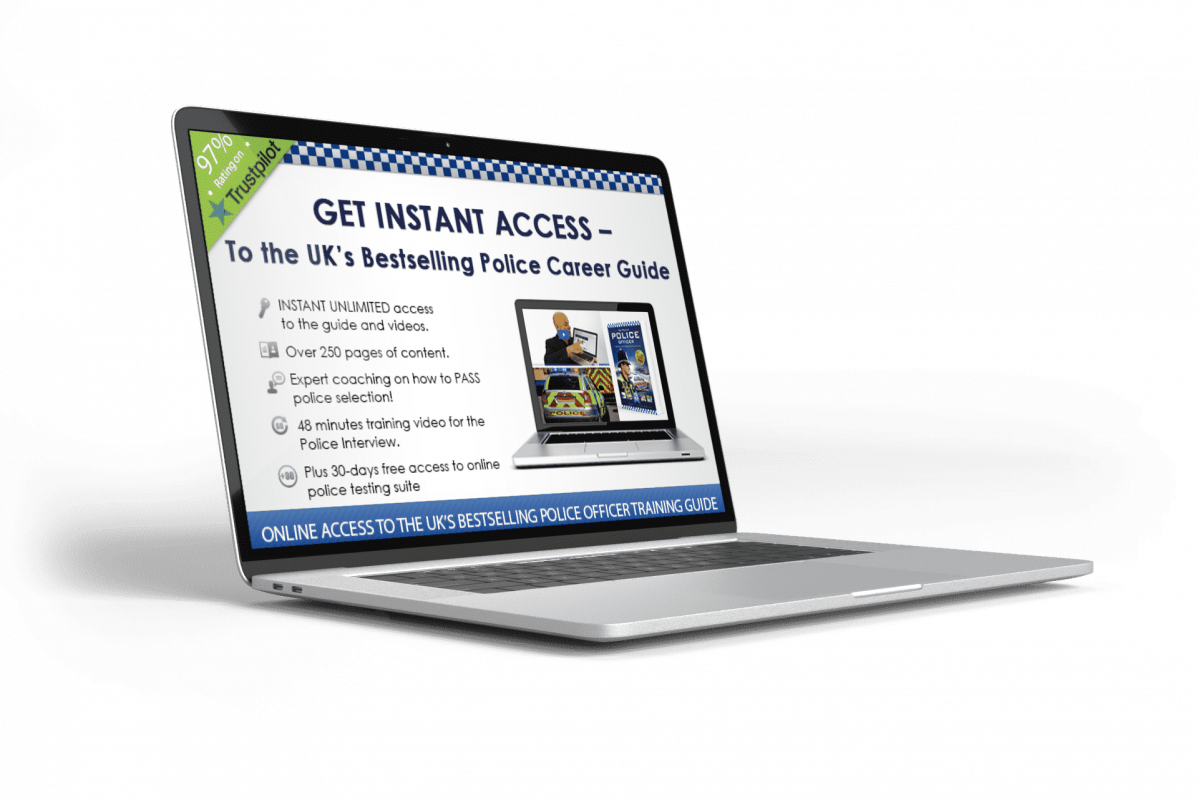
We guarantee that this online resources will teach you how to navigate the different elements of the selection process. The package contains 269+ pages of police recruitment information, tests, and videos which will guide you through each of the different elements of selection, including the application form, the assessment centre, the interviews and the fitness test.
Start Preparing Now 👉Sample Police Officer Interview Questions
Q. “Please provide an example of where you have worked as part of a team to achieve a difficult task.”
Tips for Structuring Your Response:
TIP 1: Try to think of a situation where you volunteered to work with a team in order to achieve a difficult task. It is better to say that you volunteered as opposed to being asked to get involved by another person.
TIP 2: Candidates who can provide an example when they achieved the task, despite the constraints of time will generally score higher.’
Sample Response Structure:

Pass the Police Selection Process. First Time.
Crafted for everyone, no matter your skill level or background, this guide was made to help you achieve one goal: to become a police officer.
WHAT WILL YOU LEARN?
Scoring Criteria
Essential information about how you will be assessed during every stage of the selection process.
APPLICATION FORM SAMPLE ANSWERS
Lots of up-to-date sample application form questions, responses and tips on how to pass this initial stage.
PRACTICE ONLINE ASSESSMENT PROCESS TESTS
Step-by-step information on how to pass the online assessment processes.
INTERVIEW QUESTIONS & ANSWERS
Sample answers to each of the competency-based interview questions.
INSIDER SECRETS
Insider tips on how to answer the interview questions and advice on how you will be scored.
SCORE-BOOSTING STRATEGIES
Get ahead of the competition with unique and proven strategies 16 years in the making.
Customer Success Stories
Having helped 1,000s of aspiring police officers for over 16 years, it is no wonder our customers love us…

Great books that gave me a good head start at the police assessment centre. Thank you. – Chidi O. – TrustPilot

Very good product value loads of valuable information…I am currently a serving police officer. – Jamie W. – TrustPilot

Richard and his team have been extremely helpful so far in the Police Officer process, I can’t recommend them enough. – Sara A. – TrustPilot

The books and videos were fantastic…final interview last week and passed…100% in oral communication. – Hilary. F. – TrustPilot

This is the 2nd time I have used How2become and the 2nd time I have got the job…If your looking for that slight edge over your competitors then look no further. – Chris H. – TrustPilot

WHAT’S INCLUDED IN YOUR CAREER PACK?
Complete guidance to ensure you pass the ENTIRE police recruitment process
Insider advice on how to complete the application form, including sample questions and answers
Previously successful application form responses that you can use to develop your own winning application!
Revealed – avoid the common pitfalls that most applicants make (75% of people fail the application stage – don’t be one of them!)
Which forces use sifting tests (the police SJT and behavioural questionnaires, and how you can pass them with, including a mock Behavioural Style Questionnaire to help you pass with ease)
Discover exactly how you are assessed throughout the entire selection process (hint: understanding this will allow you to know exactly how the assessors want you to act at every stage)
A complete breakdown of the new Online Assessment Process and how you MUST prepare if you wish to succeed
A detailed breakdown of the online SJT (known as Stage 1/Exercise A) including practice questions and answers so you can fully prepare
Police Officer interview questions and guidance on how to answer each one of them for Stage 2/Exercise B of the Online Assessment Process
What are competency-based questions, how to structure your responses, what keywords you MUST use, and how to impress when answering each of the 4 questions
A full breakdown of the competencies and cutting out the filler so you can memorise only what you NEED to know, making preparation a lot easier!
Practice questions and answers for the written exercise (Stage 3a/Exercise C). Practice the same skills you’ll be tested on so you enter your test fully prepared.

The Briefing Exercise broken down – how this police test is NOT a presentation like you’d expect and how there really is only ONE WAY to get this right.
Practice questions and answers for the final interview – suitable for all England and Wales police forces (this is sometimes known as the in-force interview and can be conducted before the Online Assessment Process).
The importance of ensuring you meet the minimum eligibility requirements (and understanding the role of a police officer – hint: you will need to demonstrate this!)
Why joining the Force right now is a fantastic career choice
The training and probationary period that you will undergo when you join the Force
Time-saving strategies and score-boosting methods verified by our panel of recruitment experts
How to get fit and be able to pass the fitness test and medical test
Suitable for ALL England and Wales police forces*
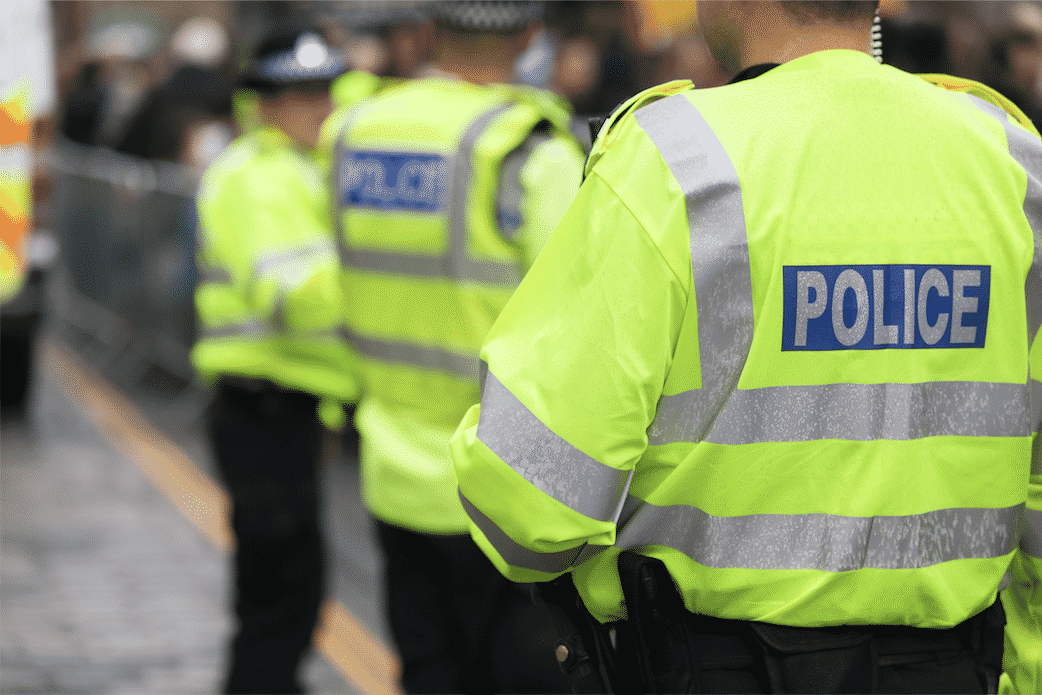
PLUS…BONUSES!

BONUS #1
150-Page Interview Skills Insider’s Guide
FOR A LIMITED PERIOD ONLY we are able to give you our powerful 150+ page ‘Interview Skills’ guide free of charge. It is the perfect guide to help you prepare for the tough police officer final interview!

- All of the most common (and not so common) interview questions you are likely to face broken down.
- Full and detailed answers to every question – ensure you always have the perfect answer!
- How to use the STAR method to come up with your own winning answers that match the experience, values, and skills the interview assessor is looking for.
- Created by interview panel experts and packed full of insider advice.
Important: This insider’s guide cannot be purchased individually anywhere else and is exclusively available as a limited-time bonus!
Worth £9.99, Yours FREE
BONUS #2
How to Get Police Fit Insider’s Guide
A concise guide to show you how you can get “police fit” and see results quickly to ensure you pass the police fitness test (even without having a gym membership!).
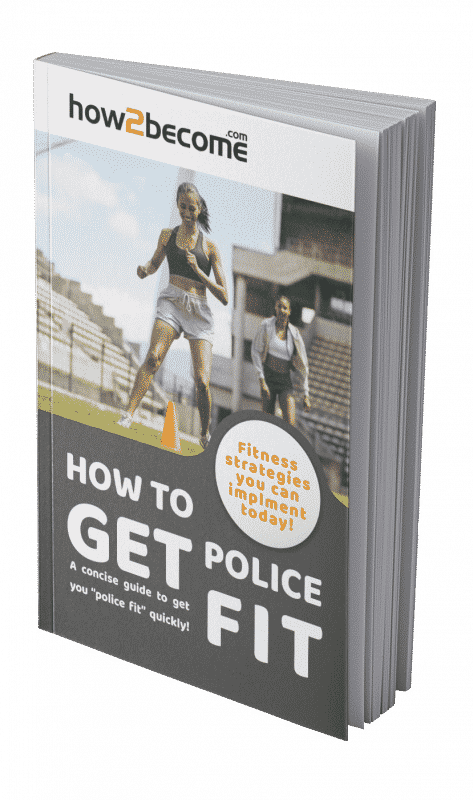
- Crafted with the fitness benchmark levels required of a police officer in mind, this guide provides an insider insight to police fitness regimes you can follow.
- Your very own “police fit” workout regime formed by former emergency service staff.
- No nonsense guide on how to score highly at the multi-stage fitness test.
- Full technique diagrams, workout timetables and regime templates you can implement right away!
Important: This insider’s guide cannot be purchased individually anywhere else and is an available exclusively as a bonus with this resource.
Worth £9.99, Yours FREE
BONUS #3
PLUS…30-Day Free Subscription Trial To The Online Police Assessment Centre Training & Testing Platform!
As well as life-time access to the police career resource, this product also includes a 30-day free trial to our brand new Online Police Assessment Centre Training and Testing Platform (usually £19.99+vat per month).

- Step-by-step video breakdowns on each element of the Police Assessment Centre to help boost your scores!
- 30+ detailed videos showing you how to answer each type of question – from quick percentage strategies to time-saving verbal reasoning strategies.
- Practice questions to go along with each video to ensure you can apply the training practically and learn faster.
- 58 interactive tests, with complete score tracking and detailed answers.
Important: This powerful free trial costs £19.99 every month for everyone else! You will get unrestricted access to all of the quick-win strategies and tip tutorials to give you the advantage right away.
Worth £19.99, Yours FREE for 30-days*
*We want you to know: This is a subscription service that is charged at just £19.99 per month after the 30-day trial expires. No minimum term. If you cancel before the 30-day trial ends, you will not be charged. Please see our terms for full details.

MORE TESTIMONIALS FROM OUR SUCCESSFUL CUSTOMERS
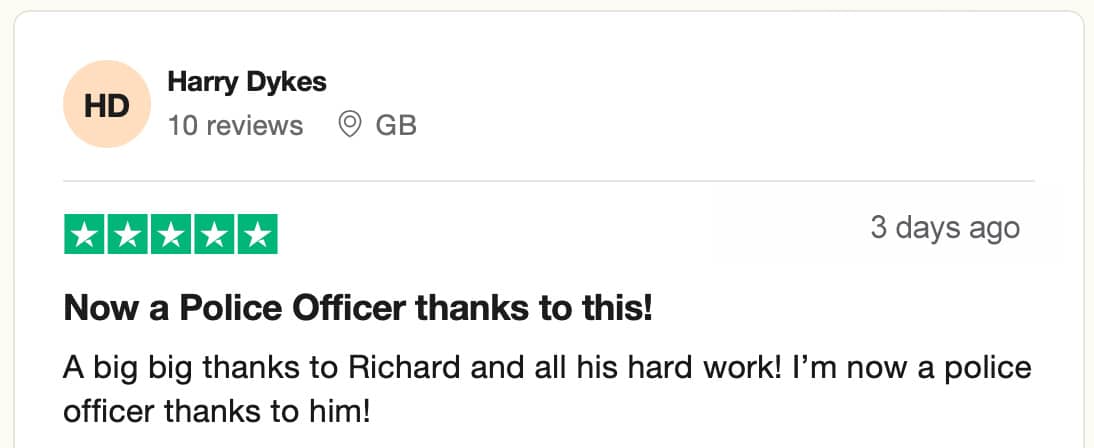
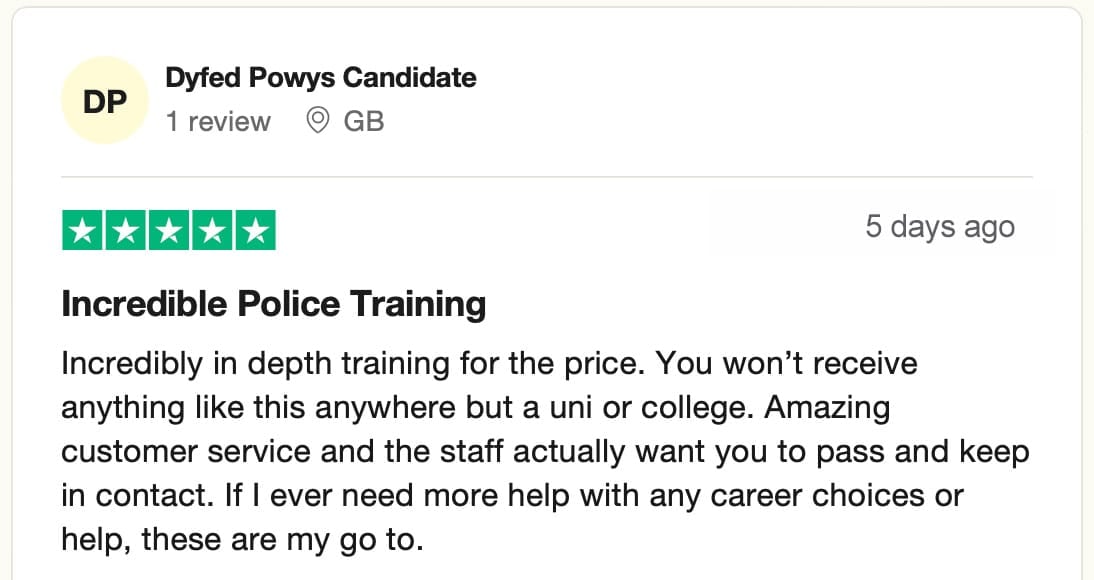

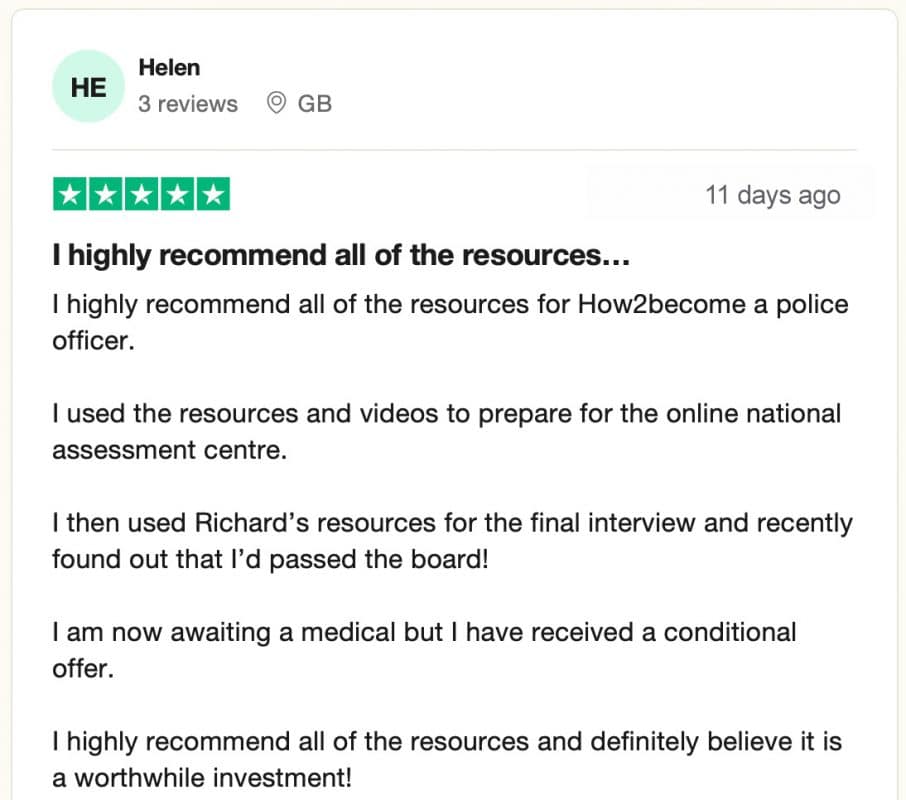

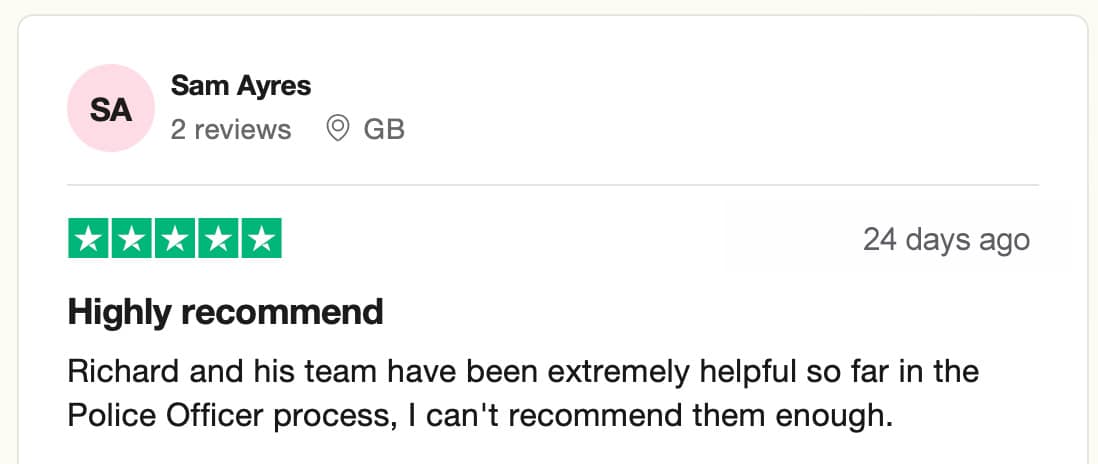
Features
You don’t just get advice on what to do. We will show you exactly how to join the police and pass the recruitment process.
Proven Guidance
Over 19 years’ of experience packed into on-demand insider recruitment guides that have helped 1000s.
Unique Training
Includes unique police constable recruitment training content built from the ground up and not found anywhere else.
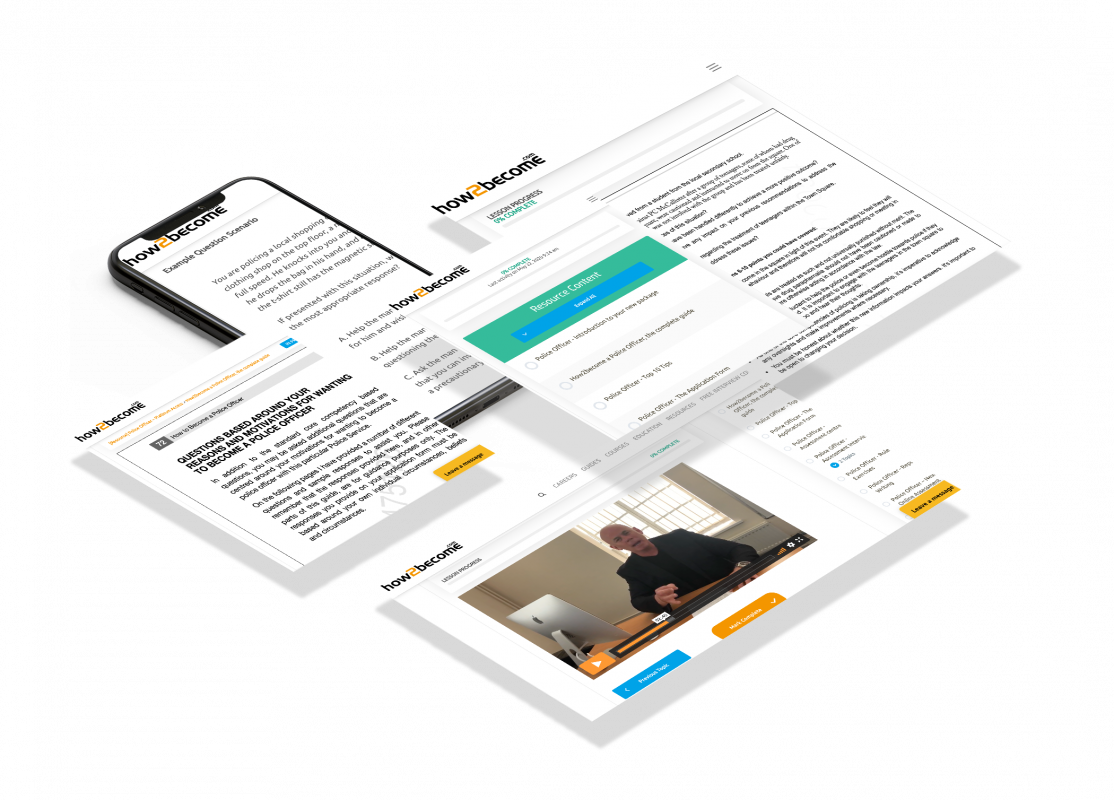
Actionable Content
We don’t just share what you need to do, but also HOW you should do it with tips and strategies you can implement today!
Swipeable Templates
These templates are worth the value of the resource themselves – we give you the exact foundations you can use to build your application and master assessment stages!
Your 286-Page Guide To Success.
Our bestselling guide in a compact, accessible, online format to hold your hand throughout the entire police constable selection process.
Created By Experts. Made For You.
With over 19 years of history behind us, we are the leaders in police recruitment advice. So whether you want to understand the scoring criteria, learn what must go on your application form, recognise what not to say at the interview, practice and pass the online tests, or watch video guides on the briefing exercises, you can access it all at your finger tips, today.
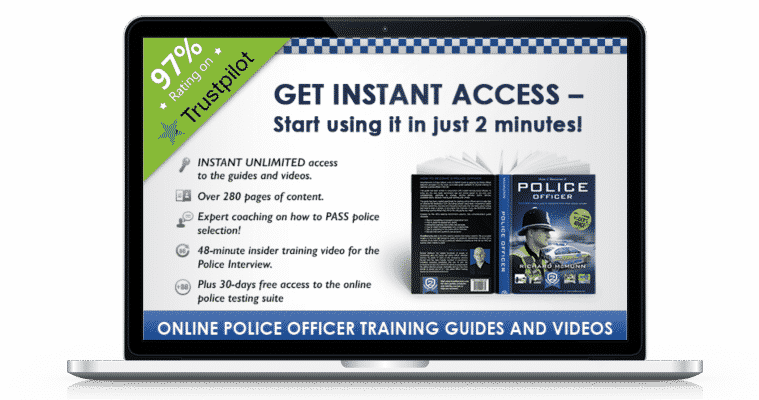
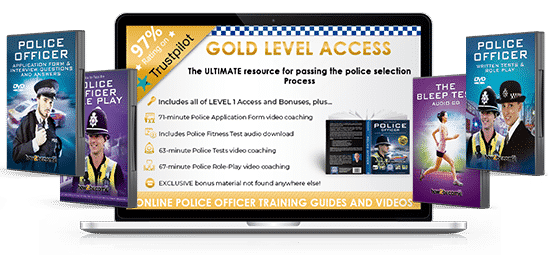
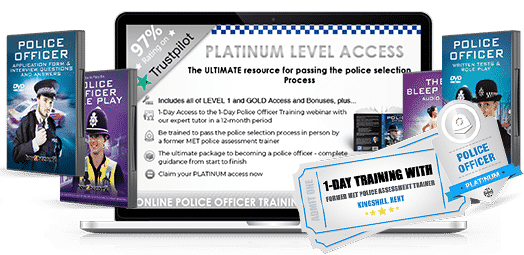
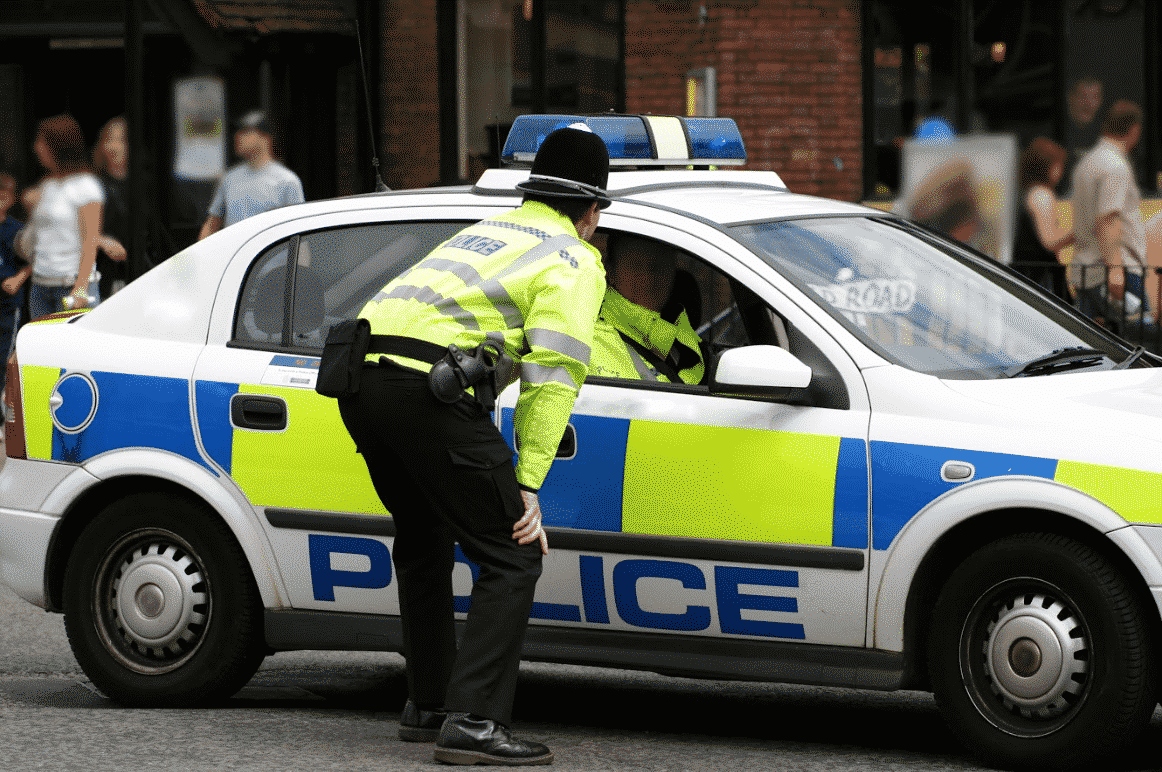
FAQ
Frequently asked questions
Simply put, this training works and is proven to help people like you to successfully join the police. As a life-time access police guide member, you will not only benefit from our flagship 280-page Police Officer careers guide (which has sold 10,000s of copies) but you’ll also get access to a dynamic portal of content that we update frequently with all the very latest information, practice material, and strategies that are helping people across England and Wales become police officers. With 1,000s of customers frequently thanking us for the career success we have helped them gain, and 16 years’ experience in providing recruitment and assessment centre training, you can rest assured knowing you are getting the best police training material on the market.
This resource is our flagship career guide, designed to help anyone looking for help conquer the gruelling police officer selection process.
It is ideal for those just staring out at the application stage, who want an “over-the-shoulder” guide to passing each stage of the process.
If you have already begun the selection process, then you’ll be able to pick up this guide from the exact stage you are at and follow the step-by-step guidance to passing the Online Assessment Process, in-force interview, final interview, fitness tests, SJTs and more with winning confidence.
Whatever stage of the process you are at, you can be confident you’ll have all the strategies and tools you need to succeed.
Yes! with our Police Officer guide you will be able to access training that has been helping students successfully become police officers for over a decade.
At How2Become.com we like to do things a little differently. Instead of just giving you access to guides which explain how the selection process works, and what you need to do to pass, we teach you HOW to do it also. For example, we don’t just provide you with sample interview questions, we provide winning sample responses and step by step guidance on how to create your own successful answers. Whether you are thinking about applying, or you are half way through the police selection process, this guide ‘hold your hand’ step-by-step. Here is a full list of everything you will get within this resource.
You will get unlimited access to all of the content contained within this resource with no time restrictions! We understand that applying to the police can be a long and stressful experience, that is why we want to take away one less worry – you will get access whenever you need, whether its just for a week, or for a year, you will have full access to the guide whenever you need it. You will also access to all future updates we make to this guide, ensuring you are getting the latest guidance.
When we launched How2Become.com we wanted to ensure our content would help as many people as possible no matter where they are, and we are achieving just that! We sell our resources to every country in the world, with 1000s of customers in the USA, UK, India, Australia, Africa and more! All of our content is either written or spoken in English, with the content designed to be as universal as possible unless otherwise stated. Our police officer resource is designed specifically for all England and Wales police forces. The British Transport Police, Ministry of Defence, Scottish Police, and PSNI have different selection processes and we have guides specifically for these. If you can’t see a guide you need in our huge catalogue, then just let us know and we will help if we can!
Whichever option you choose, you can be confident you are getting the latest and highest quality training to become a police officer. All packages contain our flagship 280-page police guide: ‘How to Become a Police Officer’, our police interview video walkthrough, and the bonuses listed on this page.
The Gold package contains extra video coaching for each core stage of the police selection process, including: 71-minute police application form coaching video, Bleep Test (Multi-stage Fitness) Audio File and Worksheet, 63-Minute Police Written Tests Coaching Video, Multiple Police Interview Video Coaching and Worksheets.
The Platinum package contains everything in Silver and Gold, but also includes a ticket to book onto one of our live Police Constable Intensive 1-Day Training webinars, run by a former MET Police trainer to coach you through the process and answer questions you may have.
As soon as your order is complete you will be able to access all of the guides, training resources, and view the on-demand video via your admin account! You will also get an email providing your access instructions. You can use any smart phone, PC, MAC, or tablet to access your materials.
Yes, absolutely! We get 100s of testimonials and comments each month from those that have used our training thanking us for the help it has given them.
Having been creating recruitment guides for the last 16 years, we know how often selection processes change. In addition, with over 40 police forces across England and Wales, they all make adjustments to their recruitment criteria. That is why we keep close ties to those in the know and we regularly update our content. You will get the latest and best strategies to enable you to become a police officer.
WHY BUY WITH HOW2BECOME?
CREATED BY THE EXPERTS
PROVEN TRAINING
EXCLUSIVE FREE BONUSES
Firstly, these guides are created by us and our team of experts – we have all the answers to your questions and will help you succeed (like we’ve been doing for the last 19 years), we update our material frequently and you can contact us at any time with any questions you have.
Secondly, we provide exclusive bonuses with all our products that you won’t find anywhere else. These bonuses include free guides, powerful online testing suites and more!
Finally, our guides and training just work. Take a look at our TrustPilot page where you will see our rating of 4.9/5. There, our customers share their positive buying experiences and more importantly the time-saving success our resources have given them (hint: they are now police officers).
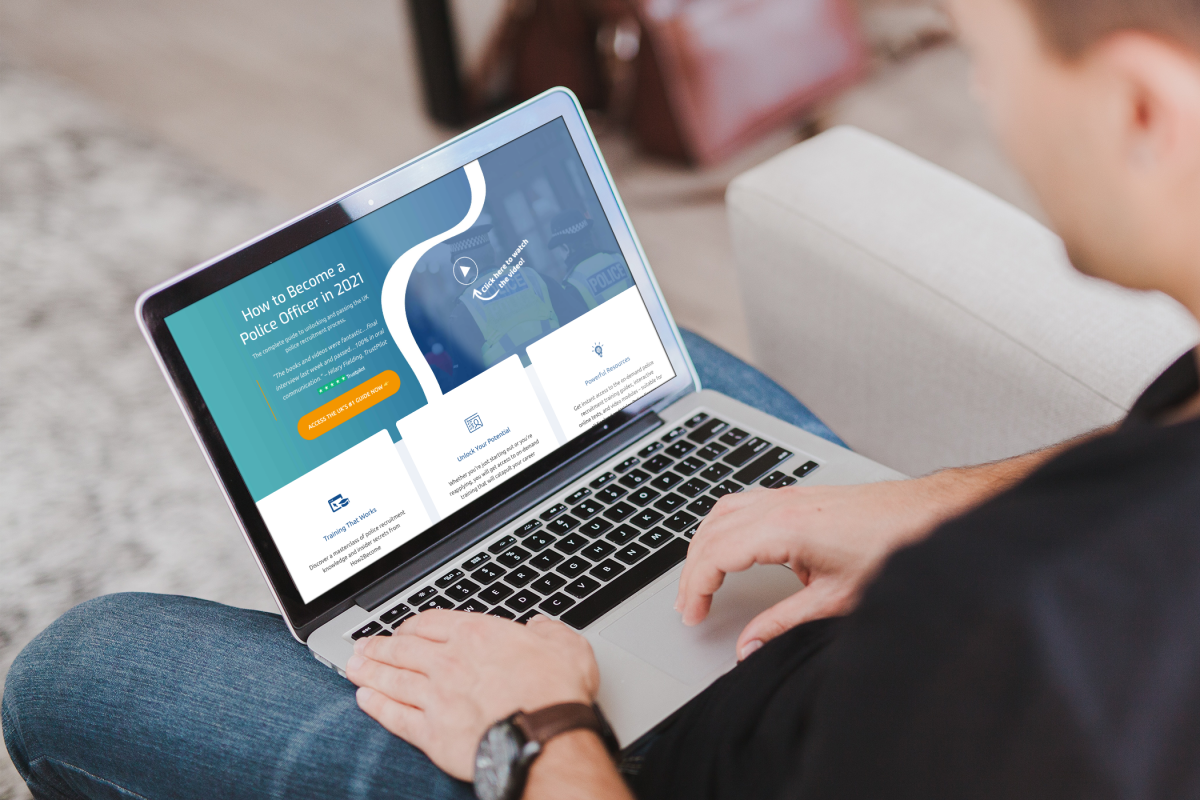
Learn how to join the POLICE SERVICE in England and Wales
We’ve helped 1000s of aspiring applicants in their journeys to becoming serving police officers across the UK. Trust the UK’s #1 careers and education specialists to help you secure your role.
Get instant access »“Great resource and excellent information for interview preparation.” Sreenivasa P.
RELATED PRODUCTS

Police Interview Guide
Want a dedicated Police Interview insider’s workbook? Use this workbook’s templates to craft your own successful answers for both the in-force/final interview and the Online Assessment Process police interview.

Police Tests Guide
Worried about the intensive police tests? This manual provides 100s of practice questions and fully worked solutions, all verified by our panel of police assessment experts. Get the assessment centre edge today.

Police Recruitment Webinar
If you want the latest insider information delivered live by a former MET Police assessment trainer, then you need to attend one of our exclusive live webinars. Get all of your police recruitment questions answered.
